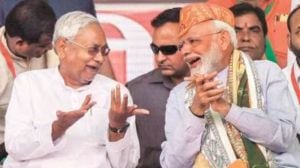Let down by Pak on Urdu, Nepal seeks India help
With an ‘‘indifferent’’ Pakistan not responding to its request for help, first made four years ago, Nepal’s Tribhuv...

With an ‘‘indifferent’’ Pakistan not responding to its request for help, first made four years ago, Nepal’s Tribhuvan University is now turning to India to revive its Urdu department.
The department has been shut since 2001 ever since Pakistan stopped sending Urdu professors—it had been the practice since 1985 with Islamabad even paying salaries.
‘‘ There are 1.5 million Muslims in Nepal. Given the urge to study Urdu, a bilateral agreement was signed with Pakistan in 1985 and an Urdu department was set up at Tribhuvan University. Pakistan sent professors till 2001 but not after that,’’ Prof S M Habibullah, head of the Political Science department and Senator in the University, told The Indian Express.
‘‘We have now written to India to send us professors so that Urdu studies can be revived,’’ says Prof Habibullah, who also heads the Urdu Subject Committee.
The university runs an intermediate certificate-level and a bachelor’s course in Urdu under the Faculty of Humanities and Social Sciences. Until 2001, the department had a strength of some 20 students. They were also granted a scholarship of Rs 300 per month for their fees.
After the 1985 agreement worked out through the Embassy of Pakistan, Dr Tahira Nayyar, from the Punjab University in Lahore, came to Kathmandu to teach Urdu.
‘‘She stayed here for ten years to establish the department and was also instrumental in upgrading the course from an intermediate level to a bachelor’s course,’’ said Madhav Koirala, Administrative Officer at the Humanities Faculty Dean Office.
Before she left, Nayyar wrote several letters to the university vice-chancellor for another teacher given the increasing workload, said Koirala. In May 1997, after Nayyar returned to Pakistan, Dr Abdul Rauf Kauser arrived and set up a Urdu Subject Committee. He left in May 2001.
‘‘Pakistan did forward us three names: Dr Aurangzeb Alamar, Khalid Iqbal Yasir and Dr Ayaz Mohammad. We selected Dr Ayaz Mohammad, who heads the department of Political Science and International Affairs at Bahauddin Zakhriya University, Multan. But Pakistan never got back to us,’’ said Madhav Koirala. Students were then told to leave, he said.
The university has now started talks with the Indian Embassy to get a Urdu teacher. ‘‘We can easily get a competent Urdu professor from UP or Bihar. Until now, our course had been following the syllabus of the Punjab University, Lahore. There was great difficulty because relevant books were not available. If we get an Indian teacher, we can change the syllabus. Indian books are also easily available in Nepal. We are hoping India says a yes,’’ said Prof Habibullah.



- 01
- 02
- 03
- 04
- 05




























